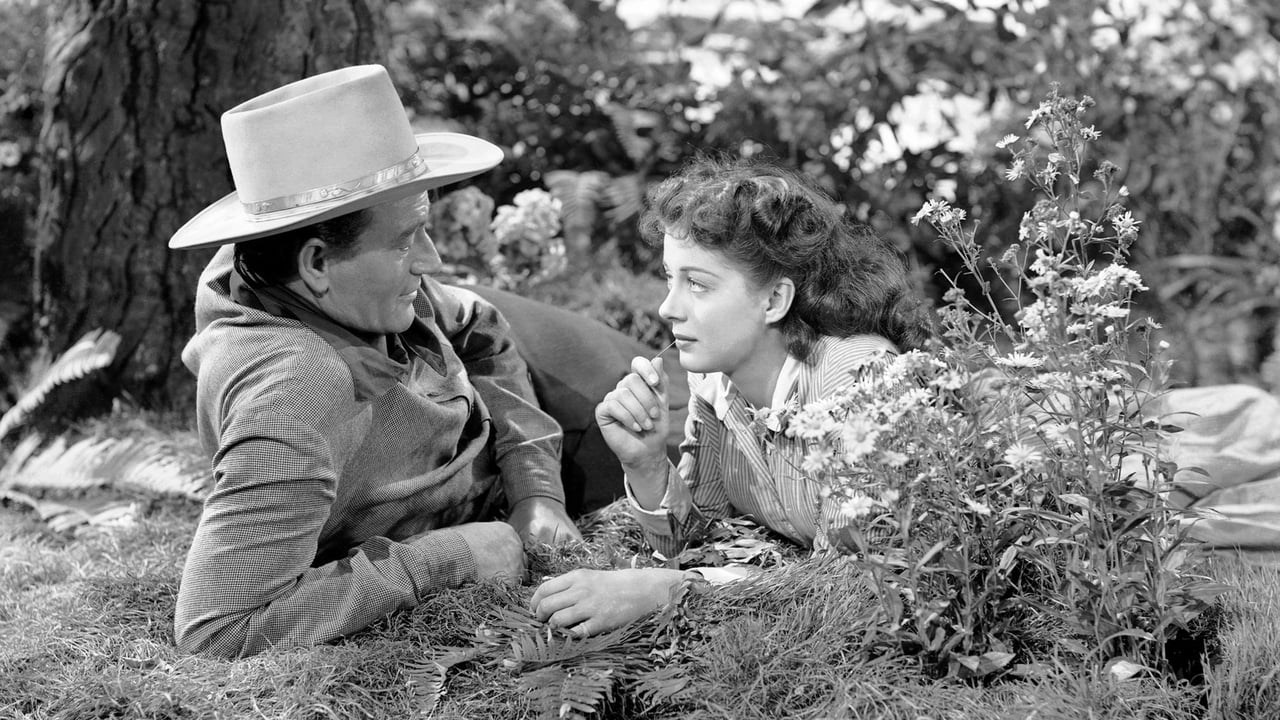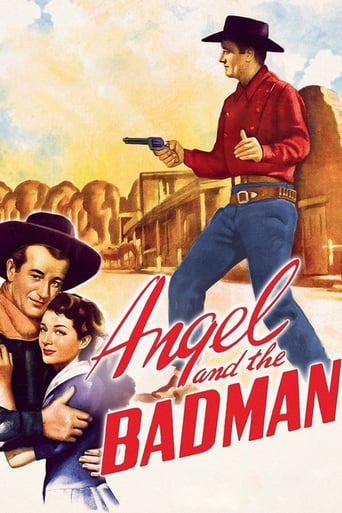



One of my all time favorites.
Just perfect...
Expected more
The movie's not perfect, but it sticks the landing of its message. It was engaging - thrilling at times - and I personally thought it was a great time.
View MoreI don't watch Westerns, but I do watch John Wayne movies. I watch this one whenever it's on. It has a certain early Talkie feel to it; though made in 1947 ! It also epitomizes Wayne's advice on acting, that he once offered a younger actor- Talk low, talk slow, and don't say too much. Enjoy this movie.
View MoreThis film is an absolute masterpiece, and one of John Wayne's best. What people who have reviewed the film, have overlooked is the why behind the relationship behind Quirt Evans (Wayne), and Penelope Worth (Gail Russell), which is essentially she was a woman who was essentially put on Earth by God for Quirt, and vice versa. Without Penelope, he would have been doomed, either from the wounds he received prior to meeting her, or by McClintock (Harry Carey), or by some other means. There was a reviewer who said "She threw herself at Quirk.", which was really not true. She was a woman of tremendous faith and devotion, and thus knew that she and Quirt had been put together for a reason,by a higher authority. So that even when he left, she knew he would return, and in the most pivotal scene of the film (Spoilers ahead) where her after she almost dies, and gets a fever, a miracle occurs, and it goes away (Which Dr. Mangram (Tom Powers) acknowledges) and has her father take her to him, and was able prevent the showdown between Quirt and Laredo Stevens (Bruce Cabot) where MCClintock would have killed Quirt. Quirt essentially knew the same thing, because he got tired of the wild life and came back to her. Finally, he was willing to give up his guns and become a farmer for Penelope. The simple reason is Quirt & Penelope were supposed to be together, and they would do whatever was necessary to remain together.
View MoreThis is a quiet western ;there's violence in the first pictures (close shot of a revolver) and towards the end but this is a true story of redemption.These quaker family is some kind of heaven where you can eat the best donuts in the world and their influence radiates on the others : take the scene of the water ;we expect a fight between Wayne and the selfish old man ;but it is not so: not only he lets the waters flow ,but when he comes to his neighbor's farm,the good mom presents him with baskets of food.as in the title of William Wyler's famous movie (1956),friendly persuasion indeed!Gail Russel had wonderful eyes and you should see her in "the night has a thousand eyes" where they merge in the sky.
View MoreFormer Chicago newspaper reporter James Edward Grant spent most of his career either penning or polishing screenplays for John Wayne, and Grant handed Wayne one of his best and earliest western classics in 1947 with "Angel and the Badman" that Wayne produced as his first film and Grant helmed. This amiable black & white oater about a scrappy saddle tramp befriended by a family of friendly Quakers after he has been wounded in a gunfight with three other men is a conversion saga. The Quakers, particularly their young, starry-eyed daughter, eventually convince the gunslinging hero to change his way, hang up his six-gun, and till the soil. John Wayne is perfectly cast as Quirt Evans, a fast-drawing, crack-shooting cowboy and Gail Russell is Penelope Worth. Clocking in at 100 minutes, "Angel and the Badman" is a top-notch horse opera that never run out of energy and triggers a surprise or two. The rest of the cast is uniformly excellent with Bruce Cabot of "Dodge City" as the evil villain Laredo Stevens and Harry Carey stealing the show every time he sneaks into the picture as Territorial Marshal Wistful McClintock. Carey is really funny, too, especially his dialogue about how he isn't going to hang Quirt with a 'new' rope. "Angel and the Badman" benefits from the chemistry between Wayne and Russell who appear to be genuinely made for each other. Although there is a lot of romance, this western boasts enough action to keep the guys happy. A cattle stampede and a runaway wagon chase are two highlights. "Riders of Destiny" lenser Archie Stout makes this Republic western look sprawling and scenic. The best scene in the movie occurs early in the action as the doctor is struggling to sedate Quirt Evans so that he can remove a bullet in his chest. No matter how much laudanum he administers to Quirt, Quirt refuses to stop thrashing around in the best. Penelope's father Thomas Worth (John Halloran of "Blood on the Sun") scrambles downstairs and retrieves Quirt's six-gun dangling outside their house, empties the cartridges from the cylinder and then sticks it into Quirt's hand and Quirt settles down for the doctor to extract the bullet. The scenes where Quirt gets an unfriendly landowner who has blocked up a stream to the Quakers' farms is memorable, too. Chief comic relief is provided by the beanpole town telegrapher (Olin Howland of "Gone with the Wind") who brags later about how close Quirt and he are after he sends a telegram for him. Actually, "Angel and the Badman" is a precursor of sorts to the Alan Ladd oater "Shane," because Quirt defends the Quakers from their enemies. The surprise ending when Quirt rides out to gun down Laredo and his henchmen is good. Grant's dialogue is good, too. "Angel and the Badman" is a thoroughly entertaining, somewhat predictable, rarely outlandish, but good looking western. The scene between Quirt and Penelope when she tells him about the significance of using "thee" and "thou" is imaginative, too.
View More